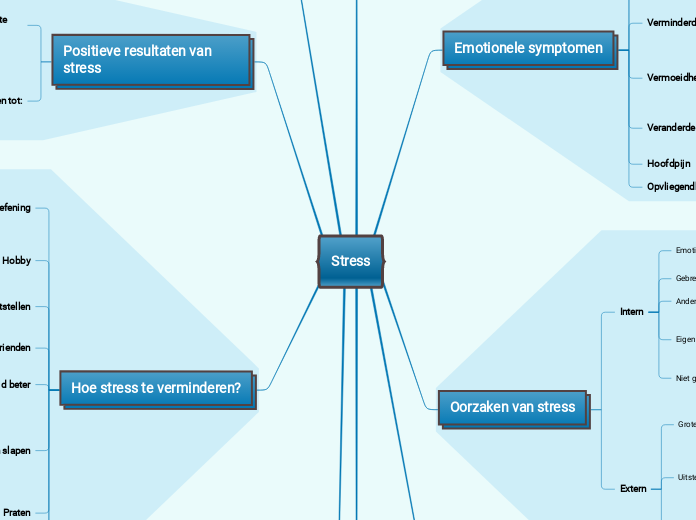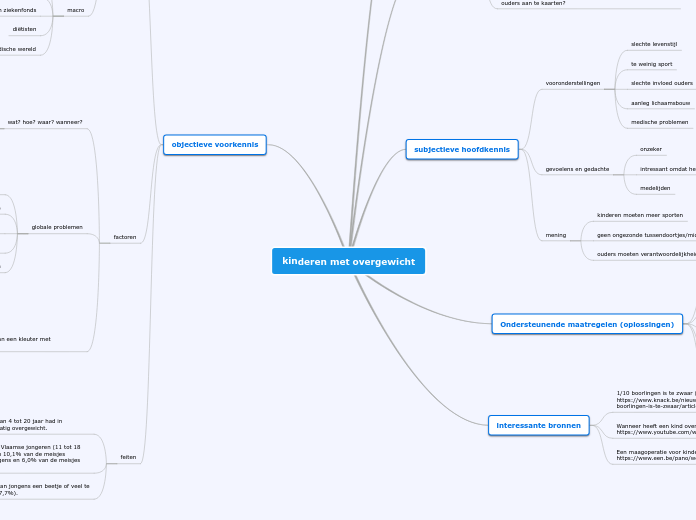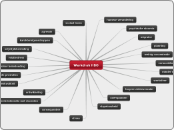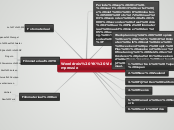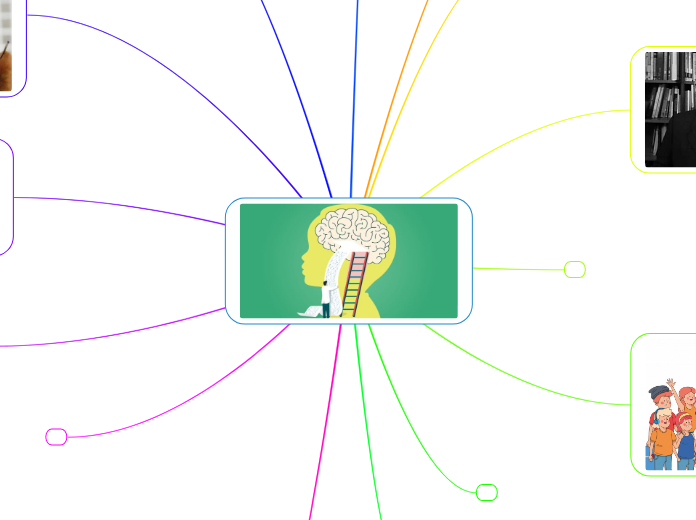Stress
The part of speech is a category to which a word is assigned according to its syntactic functions. In English the main parts of speech are noun, pronoun, adjective, determiner, verb, adverb, preposition, conjunction, and interjection.
Gevolgen van te veel stress
A conjunction is a word like 'if' 'but' or 'and' which is used to connect sentences or clauses together.
Slechte gezondheid
Geen plezier hebben
Te veel concentreren op de taak in plaats van hoe om te gaan met de stress die het heeft veroorzaakt
Slechte conditie
Geef de taak op
Subordinating conjunctions are conjunctions that are used at the beginning of subordinate clauses. Some examples of these conjunctions are: although, after, before, because, how, if, once, since, so that, until, unless, when etc.
Stilgelegd
Coordinating conjunctions always connect phrases, words, and clauses. They are: for, and, nor, but, or, yet, so.
Hoe stress te verminderen?
A preposition is one of the most exciting parts of grammar. A preposition is used to describe the location of something in relation to something else.
Eet gezonder
Ga niet uit van junkfood, want doen voel je je dik en stress over gezondheid en fitness
Verse lucht
Ga in mijn eentje een lange wandeling maken: een kans om het hoofd leeg te maken en problemen op te lossen
Praten
Praat met een familielid of vriend over alles waar je gestresst van raakt, bijvoorbeeld opdrachten, studie, werk, problemen met vrienden of familie
Ontspanning en slapen
Heb korte pauzes tussen het studeren door
Geef mezelf elke dag minstens 30 minuten ontspanning
Een regelmatige slaappatroon hebben
Plan tijd beter
A group of words used with the force of a single preposition is called phrase preposition.
Probeer niet te veel in elke dag te proppen
Gebruik een dagboek
Tijd voor vrienden
Participle preposition consists of words that end in “ing”.
Geef het sociale leven niet op
Niet uitstellen
When a preposition consists of more than one word, it is called double preposition.
Plan tijd om alles te doen
Begin dingen wanneer ze zich voor het eerst voordoen
Hobby
Compound preposition consists of two or more words.
Activiteiten die ik leuk vind, bijvoorbeeld paardrijden
Oefening
When a preposition consists of one word it is called single or simple preposition.
Doe activiteiten met vrienden
Doe activiteiten die ik leuk vind
Regelmatige lichaamsbeweging
Positieve resultaten van stress
An interjection is used to express emotion in a sentence.
Think of other interjections!
Lage stressniveaus kunnen leiden tot:
Gebrek aan motivatie
Verveling
Kleine hoeveelheden stress voor korte tijd
Helpt om door te zetten / dingen te laten gebeuren
Geeft motivatie om taken uit te voeren zonder lang genoeg te blijven hangen om een slecht effect te hebben
Gedragssymptomen
An adverb is used to describe a verb, but it can also describe an adjective or another adverb.
Adverbs normally help paint a fuller picture by describing how something happens.
Ongeduld
Frustratie
Geen tijd te verspillen aan wachten
Onzorgvuldigheid
Junkfood of afhaalrestaurants eten omdat het makkelijk is
Te weinig eten of te veel eten
Agressief gedrag
Woede jegens vrienden en familie
Rijden, woede op de weg
Potentiële stressvolle situaties
An article is a word used to modify a noun, which is a person, place, object, or idea. Technically, an article is an adjective, which is any word that modifies a noun.
Werk
Indefinite articles are the words 'a' and 'an.' Each of these articles is used to refer to a noun, but the noun being referred to is not a specific person, place, object, or idea. It can be any noun from a group of nouns.
Als ik te veel werk, stress ik over het niet doen van mijn opdrachten. Dus als ik minder werk, houd ik meer tijd over om mijn opdrachten te doen, wat minder stress zou moeten betekenen!
It refers directly to a specific noun or groups of nouns.
Als ik tot het laatste moment laat, stapelen de opdrachten zich op en dan zal ik op het allerlaatste moment in een race tegen de klok zitten om ze af te krijgen, dus mezelf gestresst!
Resultaten van het verminderen van stress
A pronoun is a word that can be used in place of a noun, typically after the noun itself has already been stated.
Hoofdpijn verminderen
A reflexive pronoun ends with ...self or ...selves and refers to another noun or pronoun in the sentence (usually the subject of the sentence). The reflexive pronouns are myself, yourself, herself, himself, itself, ourselves, yourselves, and themselves.
Gelukkiger
Demonstrative pronouns are used to demonstrate (or indicate). This, that, these, and those are all demonstrative pronouns.
Kan socialer zijn
Possessive pronouns are used to show possession. The possessive pronouns are mine, yours, his, hers, ours, and theirs.
Voel je minder gestresst en heb daardoor meer tijd om te socializen en tijd door te brengen met familie en vrienden
Geen grote zorgen
The personal pronouns are I, you, he, she, it, we, they. More often than not (but certainly not always), they replace nouns representing people.
Oorzaken van stress
An adjective is a word that's used to describe a specific noun and to provide more detail to the listener.
Extern
Superlative adjectives demonstrate a higher level of comparison between entities.
Evenementen
Examens
Opdrachten
Argumenten met mensen zoals familie en vrienden
Uitstel
Dingen tot het laatste moment uitstellen en je er dan druk over maken omdat je te veel te doen hebt in zo'n korte tijd
Grote werklast
Te veel dingen om te doen, niet genoeg tijd om ze te doen
Te veel dingen tegelijk oppakken (werk, studie)
Intern
Expresses a comparison between two entities or groups of entities in quality or degree.
Niet genoeg tijd voor hobby's
Bijvoorbeeld paardrijden
Eigen verwachtingen
Voel je een mislukking voor jezelf
Zelf normen te hoog stellen
Andere verwachten:
Gebrek aan vaardigheden
Niet zo goed als iedereen
Emoties
Zichzelf naar beneden halen/geen zelfvertrouwen hebben
Emotionele symptomen
A noun is defined as a person, place, thing or idea. Proper nouns always begin with a capital letter. Common nouns, which are general words, such as 'cars,' are not capitalized.
Opvliegendheid
Van blij naar boos in seconden
Veranderde slaapgewoonten
Compound nouns are words where two nouns have been stuck together to make a new noun. Compound nouns should be written as one word, without a hyphen.
Kan niet slapen en vaak wakker worden
Te vroeg wakker worden
Vermoeidheid
Voel je leeggezogen
Geen energie
Verminderde concentratie
A noun which refers to a group of things/people.
Heb altijd iets anders aan mijn hoofd
Kan je niet concentreren op slechts één taak tegelijk
Humeurigheid
Countable nouns are nouns that can be counted, even if the number might be extraordinarily high.
Uncountable nouns are nouns that come in a state or quantity which is impossible to count; liquids are uncountable, as are things which act
like liquids.
Gefrustreerd met alles en iedereen zonder duidelijke reden
Emotionele instortingen
Proper nouns are the names of specific people or places. They should always begin with a capital letter.
Gevoel van willen opgeven
Huilen wordt veroorzaakt door frustratie door te veel stressvolle dingen op elkaar gestapeld
Lichamelijke symptomen
A verb is an action word or 'doing' word that signifies movement in some way.
Laag energieniveau
An auxiliary verb helps the main (full) verb and is also called a 'helping verb.' With auxiliary verbs, you can write sentences in different tenses, moods, or voices.
Wil gewoon slapen
Geen zin om iets te doen
Toename van ziekte
Moeite met slapen
A participle is a verb form that can be used as an adjective or to create a verb tense. There are two types of participles: Present participle (ending -ing) and Past participle (usually ending -ed, -d, -t, -en, or -n).
Verlies van geheugen voor kleine dingen
Moeilijk om je de volgende dag ergens op te concentreren omdat je moe bent
Kan hoofdpijn veroorzaken
Rugpijn
A modal is a type of auxiliary (helping) verb that is used to express: ability, possibility, permission or obligation. The main modal verbs in the English language are: can, could, may, might, must, shall, should, will, would.
Hoofdpijn
A linking verb connects the subject with a word that gives information about the subject, such as a condition or relationship.
Resultaat van frustratie
Spierspanning
A verb with its own meaning: a verb that is not an auxiliary verb.
Strakke pijnlijke spieren (leidt tot hoofdpijn
